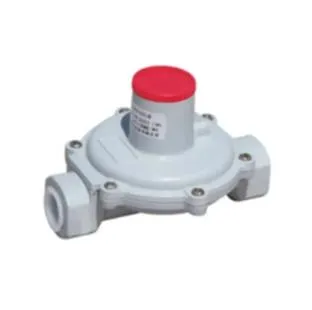
May . 16, 2025 14:13
Back to list
Essential Components in Energy and Industrial Systems: Gasification and Regulation Equipment
In the dynamic landscape of industrial and energy systems, specialized equipment plays a pivotal role in ensuring efficiency, safety, and precision. Terms such as Gasification equipment, LPG equipment, NG equipment, Precision voltage regulator, and Pressure regulating device represent critical components that underpin various operations, from energy conversion to power management. These technologies are designed to meet the demands of diverse sectors, ensuring optimal performance and reliability.

Gasification Equipment: Transforming Materials into Usable Energy
Gasification equipment is central to converting organic materials or fossil fuels into synthesis gas, a mixture of hydrogen and carbon monoxide. In power generation plants, this equipment enables the efficient extraction of energy from biomass, coal, or waste, reducing reliance on traditional fuel sources. For example, integrated gasification combined cycle (IGCC) systems utilize gasification equipment to convert coal into gas, which is then used to generate electricity with lower emissions. The versatility of such equipment extends to chemical industries, where it facilitates the production of ammonia, methanol, and other industrial chemicals, ensuring a stable supply chain for downstream applications.
LPG Equipment: Enabling Safe and Efficient Propane Use
LPG equipment is essential for the storage, transportation, and utilization of liquefied petroleum gas, a common fuel in residential, commercial, and industrial settings. In households, tanks, valves, and regulators as part of LPG equipment ensure safe delivery of gas for cooking and heating. At industrial scales, large - scale storage tanks and vaporizers in manufacturing plants rely on LPG equipment to maintain consistent fuel supply for processes like metal fabrication or food processing. The design of such equipment prioritizes safety, with features like leak detection systems and pressure relief valves, making it a reliable choice in environments where fuel efficiency and safety are paramount.
NG Equipment: Facilitating Natural Gas Distribution and Use
NG equipment (natural gas equipment) encompasses a range of tools and systems designed for the extraction, processing, and distribution of natural gas. In upstream operations, compressors and valves in drilling sites rely on NG equipment to manage high - pressure gas flows safely. Midstream, pipelines and metering stations utilize specialized NG equipment to ensure gas is transported efficiently and measured accurately. Downstream, in residential and commercial settings, boilers, furnaces, and cooktops integrated with NG equipment provide a clean and cost - effective energy source. The durability of these systems is crucial, as they must withstand harsh environmental conditions and maintain performance over long operational lifespans.
Precision Voltage Regulator: Ensuring Stable Power Supply
A Precision voltage regulator is a vital component in electrical systems, designed to maintain consistent voltage levels despite fluctuations in input power. In data centers, where uninterrupted and stable power is critical for server operations, Precision voltage regulators protect sensitive electronics from surges or drops that could cause data loss or equipment damage. Industrial machinery, such as CNC machines or robotic arms, also rely on these regulators to ensure precise motor control and prevent operational errors due to voltage instability. The compact design and high - efficiency performance of modern Precision voltage regulators make them indispensable in both large - scale industrial setups and small - scale electronic devices.
Pressure Regulating Device: Controlling Fluid Dynamics Across Industries
Pressure regulating device are engineered to maintain optimal pressure levels in pipelines, tanks, and mechanical systems, preventing damage from excessive pressure and ensuring process efficiency. In the oil and gas sector, these devices are used to control flow in wells and refineries, safeguarding equipment and minimizing waste. In water treatment plants, pressure regulating device ensure consistent water pressure for distribution networks, while in HVAC systems, they balance airflow to maintain comfortable indoor environments. Their adaptability across different media—such as gas, liquid, or air—makes pressure regulating device a versatile solution for industries where precise pressure control is non - negotiable.
Key Considerations for Equipment Selection and Maintenance
Material and Design Criteria for Industrial Equipment
When selecting Gasification equipment, LPG equipment, or NG equipment, material compatibility with operational conditions is crucial. For example, stainless steel components in LPG equipment resist corrosion from moisture in propane, extending lifespan. In gasification equipment, high - temperature resistant alloys are essential to withstand harsh reaction environments. Design factors such as ease of maintenance, modularity, and compliance with industry standards (e.g., ASME for pressure vessels) also influence equipment longevity and performance.
Integration of Precision Voltage Regulators in Complex Systems
Installing a Precision voltage regulator requires assessing the power requirements of connected devices, including voltage input range, capacity, and response time. In renewable energy systems, where solar or wind power output can fluctuate, these regulators stabilize voltage to ensure compatibility with the grid or storage batteries. Regular calibration and inspection of Precision voltage regulators are necessary to maintain their accuracy, especially in environments with high electromagnetic interference.
Safety and Performance of Pressure Regulating Devices
For pressure regulating device, proper installation and periodic testing are key to safety. Relief valves must be calibrated to open at specified pressures, while diaphragm or piston - based regulators need regular lubrication to prevent sticking. In high - risk applications, such as chemical processing, redundant pressure regulating device with fail - safe mechanisms provide an extra layer of protection, ensuring system stability even in the event of component failure.
Latest news
-
What Role Do Pressure Reducers Play in Industrial Systems?NewsJun.12,2025
-
What Role Do Gas Valves Play in Industrial Safety and Functionality?NewsJun.12,2025
-
Key Components in Energy Management and Temperature ControlNewsJun.12,2025
-
Integral Components in Mechanical and Energy SystemsNewsJun.12,2025
-
How Do Industrial Valves and Filters Ensure System Safety and Efficiency?NewsJun.12,2025
-
Essential Components for Industrial Fluid Management: Valves and SystemsNewsJun.12,2025

